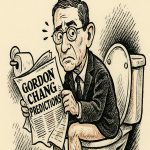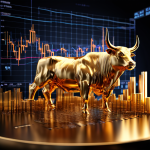Out-of-the-Box Thinking: Be Smart, Ignore the Dumb Herd
Oct 4, 2025
In volatile markets, independent thinking isn’t a luxury—it’s survival. The herd moves with emotion, not analysis, swinging from hysteria to euphoria with no awareness of the trapdoors they’re building beneath their own feet. Markets don’t punish ignorance directly; they reward clarity indirectly. Every panic, every boom, every “this time is different” moment is less about economics than mass psychology on parade.
Most investors aren’t making decisions. They’re echoing someone else’s. They buy because others are buying, sell because others are scared, and confuse volume with validation. Their “convictions” are secondhand—borrowed from talking heads, Twitter threads, newsletter gurus, or whatever chart happens to look convincing that week. This blind mimicry doesn’t just cause losses; it creates opportunities for those who can detach, observe, and act while the mob reacts.
Out-of-the-box thinking is not about being contrarian for its own sake. It’s about seeing the market as a psychological battlefield rather than a popularity contest. Those who master this distinction stop being background noise in the herd and start becoming the ones quietly picking up what others discard in their emotional stampedes.
The Folly of the Masses
History keeps replaying the same farce. Dutch Tulip Mania in the 1600s transformed flowers into speculative instruments, then into wreckage. In the late 1990s, the dot-com frenzy had retail investors piling into absurd valuations out of sheer fear of missing out. They bought at the top, then panic-sold at the bottom, locking in their losses while disciplined operators bought quality stocks at a discount. The cryptocurrency mania of 2017 and again in 2021 followed the same script: euphoric crowds at peaks, despairing exits at troughs.
The crowd behaves predictably. At the bottom, they act like scared pack animals. At the top, like single-celled organisms chasing the same stimulus. Sun Tzu advised, “Confuse the enemy so he cannot fathom your real intent.” In markets, the “enemy” is the collective behaviour of uninformed participants. If you keep your head clear while they convulse, you’ll find trades they’re too blinded to see.
The Power of Contrarian Thinking
Thinking outside the box means being willing to offend consensus. It demands courage and clarity about market dynamics and human psychology. Cicero defined wisdom as the ability to discriminate between good and bad. In investing, that translates into spotting real value amid hype and panic.
Charlie Munger captured it cleanly: “It is remarkable how much long-term advantage people like us have gotten by trying to be consistently not stupid instead of trying to be very intelligent.” He and Buffett built empires not by chasing brilliance but by systematically avoiding idiocy while the crowd sprinted toward it.
Contrarian thinking isn’t loud posturing. It’s disciplined discrimination. When the herd buys tulips, pets.com, or meme coins, the contrarian assesses intrinsic value, waits for the cracks, and acts when price finally divorces from fantasy. This is how fortunes are built in crashes and quietly compounded while others are busy reenacting the same panic rituals.
Technical Analysis: A Tool for the Discerning Mind
Technical analysis is often mocked as glorified astrology for traders, but used with precision, it becomes a scalpel for dissecting market psychology. The key isn’t blind faith in indicators; it’s sceptical application. Archimedes declared, “Give me a place to stand, and I will move the Earth.” In markets, that place is found in critical support and resistance levels, patterns revealing sentiment shifts, and volatility signals that expose fear before price does.
During the 2008 financial crisis, most investors were caught off guard. But those watching the VIX and market breadth saw storm clouds forming months earlier. When panic hit, they weren’t caught—they were positioned. Technical tools are not crystal balls; they’re structural X-rays. But as Munger warned, “To a man with a hammer, everything looks like a nail.” Used in isolation, they become traps. Combined with fundamentals, they’re weapons.
The Role of Mass Psychology
Markets aren’t driven by numbers alone; crowds power them. Humans crave the safety of consensus, even when that consensus is wrong. Galen observed, “Employment is nature’s physician.” In markets, the “employment” is active reasoning. Passive acceptance of herd emotion leads to predictable errors.
FOMO at the top and fear at the bottom remain the two most reliable forces in finance. The dot-com mania, the housing bubble, and the crypto surge all followed the same emotional arc: enthusiasm, frenzy, and collapse. Machiavelli noted, “Where the willingness is great, the difficulties cannot be great.” Discipline in the face of emotional contagion isn’t romantic; it’s profitable.
Cognitive Biases: The Enemy Within
The biggest danger isn’t the crowd; it’s the mind using shortcuts. Confirmation bias blinds investors to inconvenient facts. Anchoring makes the first number stick like glue. Recency bias convinces them the last headline is destiny. Loss aversion causes them to sell winners too early and hold onto losers too long.
Munger emphasised building better mental models than the next investor. That requires actively spotting your own biases before they metastasise into losses. Investors who fail at this end up chasing their own shadows while disciplined competitors quietly collect their capital.
Strategies for Out-of-the-Box Thinking
Develop a contrarian mindset. Question prevailing narratives, not to be contrary, but to expose cracks others ignore. Embrace rationality; Cicero’s advice to “let moderation be your guide” applies directly to position sizing and timing. Build a latticework of knowledge—psychology, history, probability—because markets reward interdisciplinary thinkers. Practice patience. Machiavelli’s “The wise man does at once what the fool does finally” is timeless advice for acting early on clear signals. Study history obsessively; cycles repeat because humans don’t evolve as fast as charts. And above all, master emotional discipline, the trait separating opportunists from casualties.
Case Study: The COVID-19 Market Crash and Recovery
March 2020 was a panic crucible. Global markets fell over 30 per cent in weeks as investors stampeded for cash. It wasn’t analysis driving decisions; it was raw fear. But those who kept their heads saw what the herd missed: quality companies trading at once-in-a-decade discounts.
Munger’s maxim, “The big money is not in the buying and selling but in the waiting,” proved true. Those who bought during the panic and waited didn’t just recover—they thrived. Indices reached new highs within a year. This was not luck. It was clear under pressure while the herd hyperventilated.
Technical signals, crowd psychology, and disciplined contrarian thinking converged into one reality: panic is temporary, value endures, and independent thinkers always eat last—but they eat best.
Conclusion: The Path of the Wise Investor
The market is a stage, and the crowd never tires of playing fools. They stampede at the bottom, hyperventilate at the top, and call it strategy. Their emotions are algorithms written centuries ago—predictable, exploitable, and endlessly recycled. Independent thinking isn’t a luxury here; it’s the moat. It’s the difference between being trampled under the herd’s hooves and quietly collecting what they drop in their panic.
History’s sharpest minds have already drawn the map. Sun Tzu taught strategic deception, Cicero preached discrimination between sense and noise, Machiavelli celebrated disciplined resolve, and Munger weaponized rationality against mass stupidity. The principles haven’t changed; only the costumes have. Whether it’s tulips, dot-com stocks, meme coins, or whatever shiny object the mob fixates on next, the pattern remains constant.
The wise investor doesn’t join the stampede; he watches it like a theatre. He steps in when the script reaches its inevitable panic scene, buys the props for pennies, and exits before the encore. Machiavelli was right: great willingness erases great difficulty. Thinking differently won’t make you popular, but it will make you rich. The herd will always exist. Your job is simple—don’t become part of the scenery.













